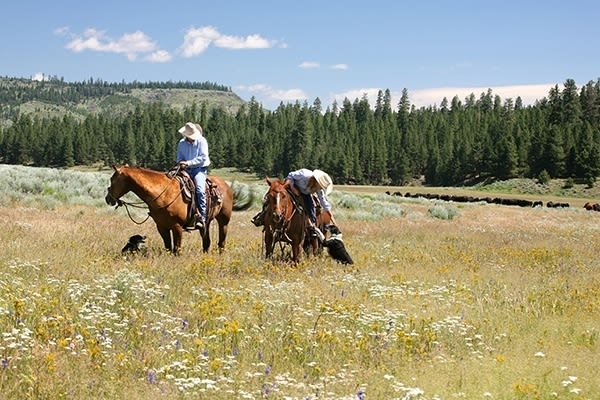Horse Suspense

Image: Courtesy Alpine Ridge Resort
TALL, FIT AND ATTRACTIVE in blue jeans and a Native American necklace bearing a large beaded pendant, Molly Gloss is sharp-witted and self-possessed, with a measure of cool reserve. The esteemed Portland author—whose novel about a widowed homesteader in 1895 Oregon, The Jump-Off Creek, won the 1990 Oregon Book Award and was a finalist for the PEN/Faulkner Award—is readying to release her new book, The Hearts of Horses. This unconventional Western follows an unusual young woman who arrives in the fictional Oregon town of Shelby in the fall of 1917 to drum up work as a horse breaker.
But before we broach the subject of Martha Lessen, Gloss, clasping her hands around her crossed knees and regarding the Portland skyline from the fifth floor of downtown’s Central Library (she serves on the library’s board), wants to talk about a subject to which she’s devoted much thought, creative output and, yes, consternation: the “cowboy myth.”
You know the plot: A lone hero rides into a town besieged by lawlessness or corruption, dispenses vigilante justice to defeat the villains, saves the life of a helpless woman and then rides off alone—always alone—into the sunset.
“There are a lot of wonderful values in the cowboy myth, values to do with self-reliance and strength and courage,” Gloss observes. “But there’s also a dark side to the cowboy. Americans’ fascination with violence, our insecurities about uppity women and swarthy foreigners and government conspiracies all come out of the cowboy myth.”
She pauses, clouds brewing in her blue eyes. “I see the cowboy myth in the morning newspaper almost every day.”
In The Hearts of Horses, however, the stranger who rides into town proclaims her independence without firing a shot. Martha mystifies clients with her “whisperer” technique for breaking horses, yet still manages to personify the cowboy fantasy to the homesteaders of Shelby. That may sound a lot like Nicholas Evans’s 1995 novel, The Horse Whisperer, which was made into a movie starring Robert Redford—except, of course, that Redford could never have played Martha, a young woman who resolutely defies gender roles in her (ultimately unattainable) pursuit of personal liberty. Eventually, the heroine’s aim to live a “footloose cowboy life” is subverted by a community intent upon drawing out and drawing in this taciturn loner in chaps and big vaquero hat.
The book hearkens back to what Gloss calls the “Western romance,” a type of story popular from the 1880s to the 1920s. These novels differed from their cocksure little brothers—pulp-fiction, shoot-’em-up Westerns—in that the central character was always a woman who, according to Gloss, was “smart and brave and strong and figured it out and didn’t swoon when the cowboy hero walked onstage.”
The pulp-fiction version took firm root, she says, seeding descendants from Philip Marlowe to Die Hard to Deadwood, the HBO series acclaimed for its supposedly realistic depiction of the West of the late 1800s—but which, according to Gloss, is still “the same old story, with the same old cowboy heroes and cowboy villains and the same old vigilantism and violence as a solution to everything.”
Although Martha repudiates violence as a solution to anything, particularly training horses, she is nonetheless a naive small-town girl; her primary foil is not some black-hatted heavy, but rather her own blinkered worldview, which is colored, ironically, by the pulp Westerns she reads for entertainment. Gloss says: “I wanted Martha to slowly realize she needs to think about different heroes and a different life than the one that’s exemplified by the cowboy hero. I wanted her to begin to see the heroism of the ordinary lives all around her, and begin to feel herself part of the community.”
Gloss can relate to Martha’s uncertainty about how far to go to fit in. She becomes self-deprecating, almost shy, when discussing the natural horsemanship lessons she started taking when her research for The Hearts of Horses rekindled an old passion for riding—and inflamed a more recent bout of insecurity. Readers often expect writers to live the lives they write about, she explains, even if it’s that of a bronco-busting cowgirl from a century ago. She laughs at her own predicament: “What if people think, ‘Oh my god, she has no balance, and her hands are too tight!’”
Gloss probably shouldn’t worry, as most readers won’t have occasion to inspect her equestrian skills—they’ll be too busy admiring her firm grip on the reins of a galloping story.




